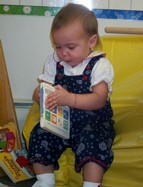 |
The Learning Ladder II
|
| Module 1: Supporting Children's Literacy | ||||
| Part 1 | Part 2 | Part 3 | Part 4 | Part 5 |
Welcome to the Introduction to Module 1!

In the Learning Ladder, when we use the word "tutor" we mean your teacher. When we use the term family child care provider, we mean someone who is licensed to care for children in their homes. In Massachusetts, a family child care provider is licensed to care for up to 6 children in their homes. Most providers care for a group of children of mixed ages.
Module Objectives
In Module 1: Supporting Children's Literacy, you will learn how to use children's books and other materials to help improve children's listening, speaking, reading and writing.
In this module you will learn ...
- how children learn to read and write.
- about emergent literacy.
- kinds of language skills children have.
- the best ways of reading books aloud to children.
- to read aloud to children in a way that keeps them interested in the characters and helps them understand the story.
- how children naturally begin to write.
- what a print-rich environment is and how it can help in a child's development.
In this module you will ...
- describe how children use writing materials
- complete a project that will include sending home a bedtime reading activity for children and their families.
- understand language and literacy development and materials for mixed ages.
- create a short form on a computer and send a note home to families asking them to write down their child's favorite books.
- identify the names of various of writing tools and surfaces.
- type a note asking parents to have their child draw a picture of the people in their family.
Terms from the Field
Below are words and definitions that you may need when you work as a Family Child Care Provider. You will learn more about these words later in the module.
When you see the speaker
![]() after each of the definitions you can hear the pronunciation of the term
and what it means.
after each of the definitions you can hear the pronunciation of the term
and what it means.
emergent literacy - Emergent literacy means the things children are able to do before they actually learn to read and write. An example of emergent literacy in children is learning how to hold a pen.
|
emergent literacy [WAV] (108kb WAV file) emergent literacy [RAM] (23kb RAM file) |
language skills - Language skills are the abilities we use to communicate by writing, speaking, listening, and reading. An example is the ability to write a letter so that people will read and understand it.
|
language skills [WAV] (127kb WAV file) language skills [RAM] (27kb RAM file) |
character - A character is a person who plays a part in a story. For example, the main character is the most important character in a story.
|
character [WAV] (89kb WAV file) character [RAM] (19kb RAM file) |
print-rich environment - A print-rich environment is a place that is full of different kinds of writing. For example, it may have a lot of books, posters on the wall, and signs on objects.
|
print-rich environment [WAV] (104kb WAV file) print-rich environment [RAM] (23kb RAM file) |
upper-case letters - Upper-case letters are capital letters. For example, CAT instead of cat.
|
upper-case letters [WAV] (332kb WAV file) upper-case letters [RAM] (9kb RAM file) |
props - Props are objects that children can use to help them imagine a real-life situation. For example, children can use plastic plates and towels to pretend to wash dishes.
|
props [WAV] (111kb WAV file) props [RAM] (23kb RAM file) |
writing tools - Writing tools can be anything people use to write with. Children sometimes use crayons for a writing tool instead of a pen or pencil.
|
writing tools [WAV] (89kb WAV file) writing tools [RAM] (19kb RAM file) |
writing surfaces - Writing surfaces can be anything people use to write on. Examples of writing surfaces are paper, blackboards, or envelopes.
|
writing surfaces [WAV] (87kb WAV file) writing surfaces [RAM] (19kb RAM file) |
If you find other words that you don't understand, you can do two things :
1. Learn how to identify a word without a dictionary.
Or
2. Use an online dictionary that will be at the bottom of each page. See below.
| Now go to the activities for Part 1. | |
